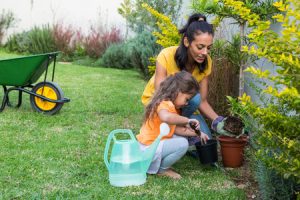Set up in 1897, the Kings Fund is a charity that focuses on improving health care in England by influencing policies and practices. Their vision is to enable the very best healthcare to be available to all.
Thank you for reading this post, don't forget to subscribe!
The Kings Fund have more recently turned their attention to gardening and how it should be recognised for the good it does us. Not only do they provide a means for physical activity, but they also give us independence and form a part of our identity.

Producing a report on what the value of gardens is when it comes to our health, the Kings Fund reported that when it comes to the aged, gardening can be thanked for preventing falls as it helps to maintain our ability to balance and keep our good gait. It also helps with preventing dementia and cognitive decline.
Unsurprisingly, the KF team also claimed something that we probably already know – that occasionally gardening can be bad for us, as those who garden are prone to developing bad backs. It’s actually very common for gardeners to suffer from back pain. It must be all that bending over to dig and pull out weeds.
On the positive side, gardens have to be recognised for their skill at unburdening us psychologically and providing an important outlet for stress relief. However, the chaps doing the report found that those who had a large area of garden to maintain may feel a bit stressed out.
However, overall gardens play a strong part in our health and wellbeing. This makes it the ideal tool to use to improve our health and our social care system. Tending gardens can provide us with a purpose that can help us to be more community minded, to enjoy the benefits of being a volunteer in addition to enabling us to recover from illness and provide dementia care.
Since this report was released, the NHS have recognised gardening for its advantages and have been prescribing community schemes as part of non-clinical services and there are now a number of schemes such as The Lambeth GP Food Co-op. With 11 practices over the South London region, patients with chronic conditions grow food to sell to King’s College Hospital. This makes it possible for one set of patients to provide food for other patients.
Other schemes that the NHS recognise include reciprocal gardening schemes. The purpose of these is to connect older people who feel isolated and don’t have a garden but enjoy tending one with those who are isolated and have a garden. The result is that the NHS doesn’t have to take people into homes and the person can continue to live an independent life.
In summary, gardening has been recognised by healthcare providers and influencers as an excellent pastime with benefits for both physical and mental health.
